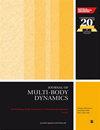Analysis and optimization of vehicle transient characteristics under sine-swept steering input with considering steering system stiffness and damping
IF 1.9
4区 工程技术
Q3 ENGINEERING, MECHANICAL
Proceedings of the Institution of Mechanical Engineers Part K-Journal of Multi-Body Dynamics
Pub Date : 2022-01-19
DOI:10.1177/14644193211072612
引用次数: 0
Abstract
This study focuses on the influence of steering system stiffness and damping on the vehicle transient characteristics at two different types of handling frequencies, and optimizes the vehicle transient characteristics with steering system stiffness and damping as optimization variables at both handling frequencies. The kinematic relationship between wheel angle and steering wheel angle is derived as well as a detailed analysis of the forces on the steering linkage. The differential equations of vehicle dynamics are developed to explain the influence of steering system stiffness and damping on the vehicle transient characteristics theoretically. The stiffness and damping, which have a significant influence on the vehicle transient characteristics, are selected by sensitivity analysis and used as variables for simulation verification. Simulation results show that the influence of steering system stiffness and damping on vehicle transient characteristics is different at high handling frequencies and low handling frequencies. The stiffness and damping are used as optimization variables and the objective evaluation indexes of vehicle transient characteristics at high handling frequencies and low handling frequencies are used as optimization targets for multi-objective optimization by the NSGA-II optimization algorithm. The optimization results show that: The yaw rate gain relative to steering wheel angle and the delay time of lateral acceleration relative to steering wheel angle are improved at both low and high frequencies.考虑转向系统刚度和阻尼的正弦波转向输入下车辆瞬态特性分析与优化
研究了两种不同操纵频率下转向系统刚度和阻尼对车辆瞬态特性的影响,并以转向系统刚度和阻尼为优化变量,对两种操纵频率下的车辆瞬态特性进行了优化。推导了车轮角与方向盘角之间的运动关系,并对转向机构的受力进行了详细分析。建立了车辆动力学微分方程,从理论上解释了转向系统刚度和阻尼对车辆瞬态特性的影响。通过灵敏度分析选择对车辆瞬态特性影响较大的刚度和阻尼作为变量进行仿真验证。仿真结果表明,在高操纵频率和低操纵频率下,转向系统刚度和阻尼对车辆瞬态特性的影响是不同的。以刚度和阻尼为优化变量,以车辆在高操纵频率和低操纵频率下的瞬态特性客观评价指标为优化目标,采用NSGA-II优化算法进行多目标优化。优化结果表明:在低频和高频下,相对于方向盘角的横摆角速度增益和相对于方向盘角的横向加速度延迟时间都有所改善。
本文章由计算机程序翻译,如有差异,请以英文原文为准。
求助全文
约1分钟内获得全文
求助全文
来源期刊

CiteScore
4.10
自引率
11.10%
发文量
38
审稿时长
>12 weeks
期刊介绍:
The Journal of Multi-body Dynamics is a multi-disciplinary forum covering all aspects of mechanical design and dynamic analysis of multi-body systems. It is essential reading for academic and industrial research and development departments active in the mechanical design, monitoring and dynamic analysis of multi-body systems.
 求助内容:
求助内容: 应助结果提醒方式:
应助结果提醒方式:


